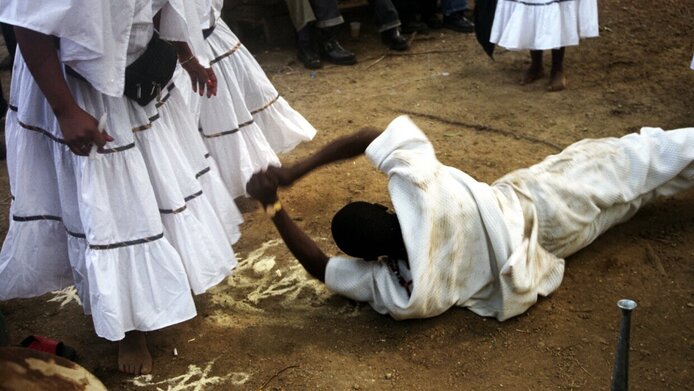From spectacle to trauma alleviation

Voodoo means deity or spirit. – Voodoo practitioners in the Dominican Republic usually speak of misterios. People possessed by such beings are at the heart of the voodoo religion. Under the influence of Hollywood clichés, one associates voodoo with mysterious rites and horror stories. But many religions include the concept of being possessed by spirits in various ways to this day. The difference lies in how religions deal with this phenomenon. Whereas Christian and Muslim priests seek to banish possessing spirits, voodoo is about accepting them and integrating them into everyday life. “Many voodoo centres are reminiscent of Catholic chapels: numerous images of saints, flowers, candles and other devotional items are arranged into small altars. Often you find them in private premises”, reports Yvonne Schaffler from her field research in the Dominican Republic, where the cultural and social anthropologist spent several years studying the societal assimilation of possession with the help of a Hertha Firnberg Grant that is awarded by the Austrian Science Fund FWF to young women researchers. The issues Schaffler investigated included questions such as what forms and functions possession can assume and in which phases of life it emerges.
Important social functions
Possession refers to a temporary state of trance (dissociation) during which individuals feel that external powers such as ancestors or deities take control of their body. These states tend to first appear at a young age. Afterwards, those “possessed” often cannot remember what they said or did during their trance. In more than 100 video-recorded episodes, Schaffler documented these events, their unfolding and the rites involved. In addition, she recorded the life histories of 19 individuals who are either voodoo practitioners or who experienced involuntary episodes of possession. The practitioners fulfil important social functions, as the anthropologist was able to illustrate. As “healers” they occupy special positions and offer services such as consultation meetings for those in a state of possession at spiritual centres. “Thanks to their position they enjoy an increase in (economic) autonomy, status and social security”, explains Schaffler in the interview with scilog.
Stress and trauma
Those involuntarily possessed feel stressed by the trance-like states, since the spirits contact them spontaneously and defy their will. Their distress is often expressed in disorganised or aggressive behaviour. “I found that the sufferers had often experienced painful things such as domestic violence, loss of close friends or relatives or discrimination”, reports the scientist. In addition it was shown that these individuals also tend to have physical symptoms such as sleeplessness or headaches. Traumatic experiences are also frequently found in the life history of the unwittingly possessed. Only recently have researchers devoted attention to this aspect, i.e. the connection between possession and trauma. Formerly, most of the studies highlighting this connection were conducted in civil-war regions in Africa. Schaffler’s data confirm these results and provide important insights for trauma and dissociation research.
Voodoo as a coping strategy
Investigating the involuntarily possessed is also potentially interesting from a therapeutic standpoint. Schaffler noted, for instance, that a hostile social environment and the attempt to exorcise the “demons” through rituals only increase the suffering and stress of the affected individuals. A so-called initiation process, on the other hand, can serve as a coping strategy. This process involves the repeated practising of states of possession under professional guidance. “In this way, what used to be an uncontrolled trance becomes structured and controllable”, notes Schaffler. Thus, both the individual's biography and the social environment condition the perception of personal experience and behaviour that is often hard or even impossible to describe. Similar to the therapeutic approach of psychodrama, which has participants work on their issues by means of performing real live scenes, also voodoo rituals allow for the re-enactment of past experiences in a benevolent environment, which may have positive effects. This probably explains why in Afro-American cultures possession is not regarded as something that needs to be prevented as a general rule. Instead, it is welcomed as a form of getting into contact with the spirits and opening up improved possibilities of self-expression. Voodoo rituals are fundamentally focused on positive energies and healing forces. “People don’t want to be at loggerheads with the spirits”, is how the researcher puts it.
Spiritual practices are booming
“Accordingly, many rituals are entertaining, amusing and even feel like a party”, notes Yvonne Schaffler. Particularly in times of economic problems such as those currently experienced in the Dominican Republic, spiritual practices flourish, and healing or protective rituals and other practices are not a phenomenon limited to marginal groups. “Many practitioners have clients in New York”, notes Schaffler. New Orleans, for instance, is also a voodoo hotspot, where the popular ragdolls are considered to be protective spirits. The nasty voodoo doll into which one sticks needles to hurt an adversary is the exception rather than the rule and mainly occurs in Hollywood movies. This said, the Caribbean also harbours a “black magic” branch. However, practitioners “working with both hands”, one that heals and one that inflicts harm, do not engage in group-rituals. They prefer to practise alone, in places far from their homes.
Personal details Yvonne Schaffler is a cultural and social anthropologist focusing on medical anthropology. She conducted the FWF-funded Hertha-Firnberg project “Spirit possession modi and function” (2011-2016) at the Medical University of Vienna (MUW). Next to her research, Schaffler teaches at the MUW and at the Sigmund Freud Privatuniversität in Vienna and is training to be a psychotherapist.
Publications






